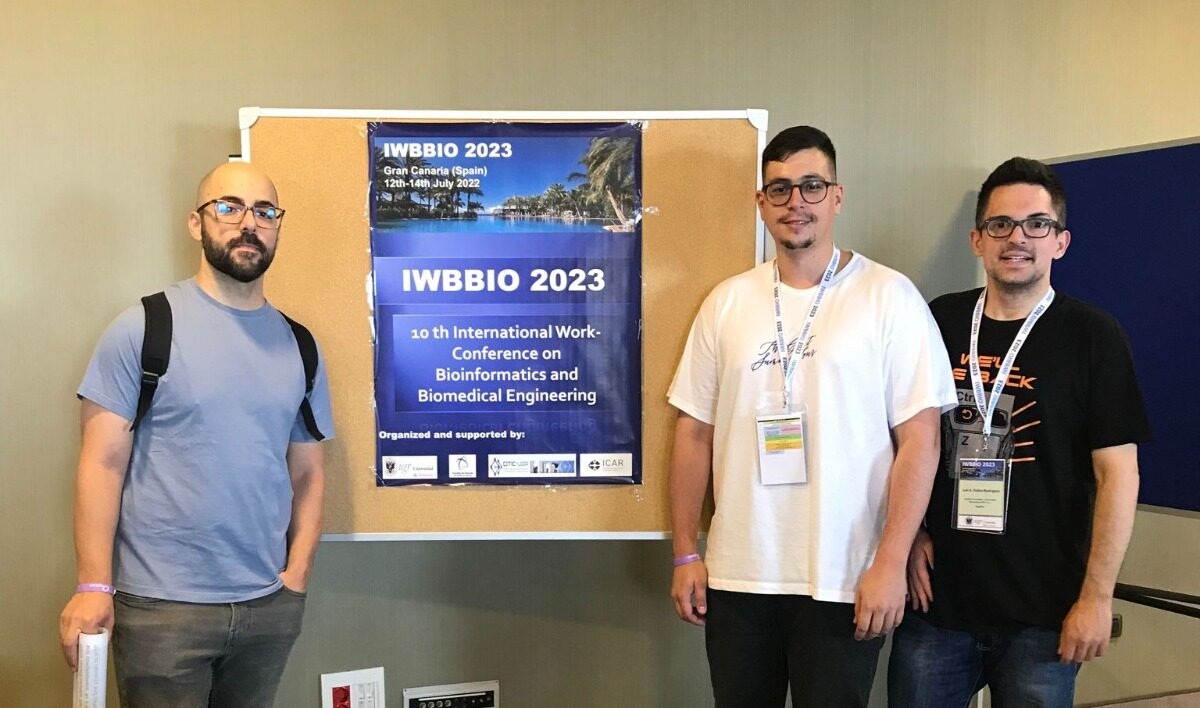During this international congress recently held in Gran Canaria, the research team presented several studies related to Bioinformatics and Genomics developed within their area.
Between July 12 and July 14, 2023, the Genomics Area of the Institute of Technology and Renewable Energies (ITER) took part in the 10th International Congress on Bioinformatics and Biomedical Engineering (IWBBIO 2023) held in Gran Canaria, Spain. The event, organized by the University of Granada, brought together prominent professionals and researchers from the field of bioinformatics and biomedical engineering worldwide, providing a forum for discussions on the latest advances in this area with the aim of fostering scientific collaborations and best practice exchanges among participants.
Several members of the Genomics Area and collaborators presented three notable studies that have been recognized for their relevance and innovation in the field of genomic sequencing and bioinformatics analysis, namely:
- “Assessing Bioinformatic Tools for de Novo Assembly of Nanopore Sequencing Data from Human Whole-Genomes”. Authors: Adrián Muñoz-Barrera, Víctor García-Olivares, Luis A. Rubio-Rodríguez, David Jáspez, José M. Lorenzo-Salazar, Rafaela González-Montelongo, Carlos Flores. This work addresses the evaluation of bioinformatics tools for de novo assembly of human whole-genome sequencing data obtained with nanopore technology. The study provides valuable information to improve the accuracy and efficiency of genomic analysis, which is crucial for advancing personalized medicine and biomedical research.
- “Bioinformatics Approaches to Characterize the Monkeypox Virus Genomes from Cases of the Mid-2022 Outbreak”. Authors: Adrián Muñoz-Barrera, Laura Ciuffreda, Julia Alcoba-Florez, Luis A. Rubio-Rodríguez, Héctor Rodríguez-Pérez, Helena Gil-Campesino, Diego García-Martínez de Artola, Josmar Salas-Hernández, Julia Rodríguez-Núñez, Antonio Íñigo-Campos, Víctor García-Olivares, Oscar Díez-Gil, Rafaela González-Montelongo, Agustín Valenzuela-Fernández, José M. Lorenzo-Salazar, Carlos Flores. During the conference, the research team also presented a study of the genome of the Monkeypox virus, the pathogen responsible for the outbreak that started in April 2022 in Europe, using different bioinformatics approaches. Its innovative approach has allowed for a deeper understanding of this pathogen and lays the analytical groundwork for future strategies for controlling and preventing similar outbreaks. For more detailed information on this work, you can refer to their bioinformatics repository on the ITER website: https://github.com/genomicsITER/monkeypox
- “Enabling Real-Time Analysis of Nanopore 16S rRNA Sequencing Data with NanoRTax”. Authors: Héctor Rodríguez-Pérez, Laura Ciuffreda, Carlos Flores. The research team presented a new bioinformatics application, NanoRTax, which allows for real-time analysis of 16S rRNA sequencing data. This application is designed to process data obtained with third-generation sequencing technologies based on nanopores and has the potential to revolutionize the identification of microorganisms in various areas, including public health and environmental research, by reducing analysis times. More details about this tool can be found in the bioinformatics repository on our website: https://github.com/genomicsITER/NanoRTax
The responsible members of the Genomics Area at ITER expressed their satisfaction with their team’s participation in the IWBBIO 2023 congress and highlighted the importance of continuing to advance the application of bioinformatics and biomedical engineering to address current challenges in the field of genomics and medicine.
Full abstracts of the presented works are available on the official website of the IWBBIO 2023 congress: Link to Program and Abstracts.


